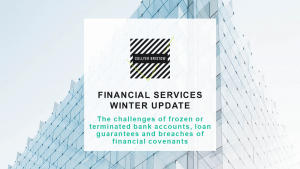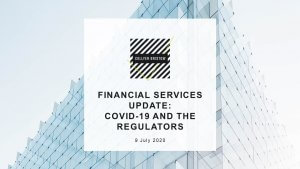- Banking & financial disputes
- Financial services

Longer Reads
UPDATES TO THE COVID-19 TEMPORARY INSOLVENCY MEASURES UNDER THE CORPORATE INSOLVENCY AND GOVERNANCE ACT 2020
With England exiting its second national lockdown due to the pandemic and, in some areas, entering stricter measures under Tier 3, there is no doubt that many businesses will be faced with further financial pressures. This makes the temporary COVID-19 insolvency measures more important than ever. Our Banking & financial disputes team explores.
3 minute read
Published 8 December 2020
Key information
We have previously written about both the permanent changes introduced by the Corporate Insolvency and Governance Act 2020 (“CIGA”), and some of the temporary COVID-19 measures that were introduced when the Act first came into force. With England exiting its second national lockdown due to the pandemic and, in some areas, entering stricter measures under Tier 3, there is no doubt that many businesses will be faced with further financial pressures. This makes the temporary COVID-19 insolvency measures more important than ever. The temporary measures have now been updated by the CIGA (Coronavirus) (Early Termination of Certain Temporary Provisions) Regulations 2020 and the CIGA (Coronavirus) (Suspension of Liability for Wrongful Trading and Extension of the Relevant Period) Regulations 2020 and this article discusses those changes.
MORATORIUM UNDER PART A1 OF THE INSOLVENCY ACT 1986
CIGA introduced the new moratorium procedure. The procedure leaves the company in the control of the directors, subject to the supervision of an insolvency practitioner acting as a Monitor. As part of the procedure, the Monitor is required to file a statement that the moratorium is likely to result in the rescue of the company as a going concern. When CIGA was first brought into force, there was a temporary measure allowing this statement to be qualified by reference to COVID-19 where the moratorium would result in the rescue of a company as a going concern, were it not for the financial impact of COVID-19. This temporary provision ceased on 30 September 2020, leaving companies financially affected by the pandemic now potentially unable to access the procedure.
Under a further temporary provision, companies will be eligible for a moratorium even if they have been subject to an insolvency procedure (such as an administration or Company Voluntary Arrangement (“CVA”) moratorium) in the last 12 months. Under the usual provisions, these companies would be excluded. This temporary provision has been extended to 30 March 2021.
TEMPORARY SUSPENSION OF WRONGFUL TRADING LIABILITY
Directors are usually under a duty to minimise any potential loss to the company’s creditors where they know, or ought to have known, that there is no real prospect of the company avoiding insolvency. Breaching this duty can result in wrongful trading, which incurs personal liability for the directors. When CIGA was first introduced, it included a temporary suspension of this liability by providing that the court should assume that a director was not responsible for any worsening of the financial position of the company or its creditors during the relevant period. The relevant period initially covered the period from 1 March 2020 to 30 June 2020, but it was extended over the summer and eventually terminated on 30 September 2020.
In a recent U-turn, the government have reintroduced the suspension of the wrongful trading liability and this new suspension is set to cover the period 26 November 2020 to 30 April 2021. However, the new provisions do not contain a retrospective element. This leaves an 8-week gap where directors remain potentially liable for wrongful trading between 1 October 2020 and 25 November 2020 where a company continued to trade whilst insolvent, even if that insolvency was caused by the pandemic. It remains unclear what impact this will have, if any.
Note that there are some exceptions to the exclusion, such as for insurance companies and banks.
STATUTORY DEMANDS AND WINDING UP PETITIONS
Usually, where a company is unable to pay its debts as they fall due, a creditor is able to serve a statutory demand which will allow them to wind up the company if the debt is not paid within three weeks.
The temporary COVID-19 rules prevent a creditor from using an unsatisfied statutory demand as the basis upon which to present a winding-up petition. The time limit for this rule has been extended and it now applies to winding-up petitions presented between 27 April 2020 and 31 December 2020 on the basis of a statutory demand served between 1 March 2020 and 31 December 2020. This is an absolute prohibition and applies equally to debtors financially unaffected by COVID-19.
In addition to the above, there is a prohibition on presenting any other debt-based winding-up petitions or making winding-up orders on that basis, unless the COVID-19 test can be satisfied. That means that unless the creditor has reasonable grounds to believe that COVID-19 has not had a financial effect on the company, or that the company would not be able to pay its debts even if COVID-19 had not had a financial effect, they cannot present a debt-based winding-up petition. Further, the court cannot make a winding-up order unless it is satisfied that the ground relied on by the debtor would be applicable, even if COVID-19 had not had a financial effect.
This provision offers some protection to companies who have been financially impacted by the pandemic (who would have usually been able to pay their debts as they fall due), but also remains a source of some frustration for creditors.
SMALL SUPPLIERS’ RIGHT TO TERMINATE
It is usual for clauses terminating a contract, or permitting a party to terminate the contract, if the other party enters a relevant insolvency procedure (such as liquidation, administration or CVA) to be included in a contract. However, these clauses have been invalidated in some contracts under CIGA. In brief, this generally applies to contracts for the supply of goods or services.
However, under the temporary measures, small suppliers are excluded from those restrictions until 30 March 2021 and therefore can utilise any contractual right to terminate in the event that their customer enters an insolvency procedure. To be considered a small supplier, the supplier must meet two of the following conditions in relation to its most recent financial year:
• have a turnover of £10.2m or less;
• have balance sheet assets of £5.1m or less; or
• have no more than 50 employees.
Financial service providers are largely excluded from this temporary measure.
As the pandemic continues, with the prospect of further lockdown measures in the new year, these temporary provisions will no doubt undergo further review and could possibly be extended once more. Indeed, the most recent provisions extending the suspension of liability for wrongful trading to 30 April 2021 suggests that the government are now looking to that date as a potential ballpark for the resumption of some normality and therefore it is possible that the other measures will be extended in line with that date.
Related content
Longer Reads
UPDATES TO THE COVID-19 TEMPORARY INSOLVENCY MEASURES UNDER THE CORPORATE INSOLVENCY AND GOVERNANCE ACT 2020
With England exiting its second national lockdown due to the pandemic and, in some areas, entering stricter measures under Tier 3, there is no doubt that many businesses will be faced with further financial pressures. This makes the temporary COVID-19 insolvency measures more important than ever. Our Banking & financial disputes team explores.
Published 8 December 2020
Associated sectors / services
Authors
We have previously written about both the permanent changes introduced by the Corporate Insolvency and Governance Act 2020 (“CIGA”), and some of the temporary COVID-19 measures that were introduced when the Act first came into force. With England exiting its second national lockdown due to the pandemic and, in some areas, entering stricter measures under Tier 3, there is no doubt that many businesses will be faced with further financial pressures. This makes the temporary COVID-19 insolvency measures more important than ever. The temporary measures have now been updated by the CIGA (Coronavirus) (Early Termination of Certain Temporary Provisions) Regulations 2020 and the CIGA (Coronavirus) (Suspension of Liability for Wrongful Trading and Extension of the Relevant Period) Regulations 2020 and this article discusses those changes.
MORATORIUM UNDER PART A1 OF THE INSOLVENCY ACT 1986
CIGA introduced the new moratorium procedure. The procedure leaves the company in the control of the directors, subject to the supervision of an insolvency practitioner acting as a Monitor. As part of the procedure, the Monitor is required to file a statement that the moratorium is likely to result in the rescue of the company as a going concern. When CIGA was first brought into force, there was a temporary measure allowing this statement to be qualified by reference to COVID-19 where the moratorium would result in the rescue of a company as a going concern, were it not for the financial impact of COVID-19. This temporary provision ceased on 30 September 2020, leaving companies financially affected by the pandemic now potentially unable to access the procedure.
Under a further temporary provision, companies will be eligible for a moratorium even if they have been subject to an insolvency procedure (such as an administration or Company Voluntary Arrangement (“CVA”) moratorium) in the last 12 months. Under the usual provisions, these companies would be excluded. This temporary provision has been extended to 30 March 2021.
TEMPORARY SUSPENSION OF WRONGFUL TRADING LIABILITY
Directors are usually under a duty to minimise any potential loss to the company’s creditors where they know, or ought to have known, that there is no real prospect of the company avoiding insolvency. Breaching this duty can result in wrongful trading, which incurs personal liability for the directors. When CIGA was first introduced, it included a temporary suspension of this liability by providing that the court should assume that a director was not responsible for any worsening of the financial position of the company or its creditors during the relevant period. The relevant period initially covered the period from 1 March 2020 to 30 June 2020, but it was extended over the summer and eventually terminated on 30 September 2020.
In a recent U-turn, the government have reintroduced the suspension of the wrongful trading liability and this new suspension is set to cover the period 26 November 2020 to 30 April 2021. However, the new provisions do not contain a retrospective element. This leaves an 8-week gap where directors remain potentially liable for wrongful trading between 1 October 2020 and 25 November 2020 where a company continued to trade whilst insolvent, even if that insolvency was caused by the pandemic. It remains unclear what impact this will have, if any.
Note that there are some exceptions to the exclusion, such as for insurance companies and banks.
STATUTORY DEMANDS AND WINDING UP PETITIONS
Usually, where a company is unable to pay its debts as they fall due, a creditor is able to serve a statutory demand which will allow them to wind up the company if the debt is not paid within three weeks.
The temporary COVID-19 rules prevent a creditor from using an unsatisfied statutory demand as the basis upon which to present a winding-up petition. The time limit for this rule has been extended and it now applies to winding-up petitions presented between 27 April 2020 and 31 December 2020 on the basis of a statutory demand served between 1 March 2020 and 31 December 2020. This is an absolute prohibition and applies equally to debtors financially unaffected by COVID-19.
In addition to the above, there is a prohibition on presenting any other debt-based winding-up petitions or making winding-up orders on that basis, unless the COVID-19 test can be satisfied. That means that unless the creditor has reasonable grounds to believe that COVID-19 has not had a financial effect on the company, or that the company would not be able to pay its debts even if COVID-19 had not had a financial effect, they cannot present a debt-based winding-up petition. Further, the court cannot make a winding-up order unless it is satisfied that the ground relied on by the debtor would be applicable, even if COVID-19 had not had a financial effect.
This provision offers some protection to companies who have been financially impacted by the pandemic (who would have usually been able to pay their debts as they fall due), but also remains a source of some frustration for creditors.
SMALL SUPPLIERS’ RIGHT TO TERMINATE
It is usual for clauses terminating a contract, or permitting a party to terminate the contract, if the other party enters a relevant insolvency procedure (such as liquidation, administration or CVA) to be included in a contract. However, these clauses have been invalidated in some contracts under CIGA. In brief, this generally applies to contracts for the supply of goods or services.
However, under the temporary measures, small suppliers are excluded from those restrictions until 30 March 2021 and therefore can utilise any contractual right to terminate in the event that their customer enters an insolvency procedure. To be considered a small supplier, the supplier must meet two of the following conditions in relation to its most recent financial year:
• have a turnover of £10.2m or less;
• have balance sheet assets of £5.1m or less; or
• have no more than 50 employees.
Financial service providers are largely excluded from this temporary measure.
As the pandemic continues, with the prospect of further lockdown measures in the new year, these temporary provisions will no doubt undergo further review and could possibly be extended once more. Indeed, the most recent provisions extending the suspension of liability for wrongful trading to 30 April 2021 suggests that the government are now looking to that date as a potential ballpark for the resumption of some normality and therefore it is possible that the other measures will be extended in line with that date.
Associated sectors / services
- Banking & financial disputes
- Financial services
Authors
Need some more information? Make an enquiry below.
Subscribe
Please add your details and your areas of interest below
Article contributor
Robin
HenryPartner - Head of Dispute Resolution Services
Specialising in Banking & financial disputes, Commercial disputes, Corporate recovery, restructuring & insolvency, Financial regulatory and Personal insolvency
Enjoy reading our articles? why not subscribe to notifications so you’ll never miss one?
Subscribe to our articlesMessage us on WhatsApp (calling not available)
Please note that Collyer Bristow provides this service during office hours for general information and enquiries only and that no legal or other professional advice will be provided over the WhatsApp platform. Please also note that if you choose to use this platform your personal data is likely to be processed outside the UK and EEA, including in the US. Appropriate legal or other professional opinion should be taken before taking or omitting to take any action in respect of any specific problem. Collyer Bristow LLP accepts no liability for any loss or damage which may arise from reliance on information provided. All information will be deleted immediately upon completion of a conversation.
Close










































































